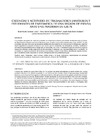Identificador persistente para citar o vincular este elemento:
https://accedacris.ulpgc.es/jspui/handle/10553/58275
| Título: | Creencias y actitudes de trabajadores sanitarios y estudiantes de enfermería de una región de España ante una pandemia de gripe | Otros títulos: | Beliefs and attitudes of health workers and nursing students toward an influenza pandemic in a region of Spain | Autores/as: | Santana-López, Borja Nicolás Santana-Padilla, Yeray Gabriel Martín Santana, Josefa Delia Elia Santana-Cabrera, Luciano Escot Rodríguez, Cristina |
Clasificación UNESCO: | 531207 Sanidad | Palabras clave: | Pandemias Gripe humana Actitud frente a la salud Enfermería Administración de personal, et al. |
Fecha de publicación: | 2019 | Publicación seriada: | Revista Peruana de Medicina Experimental y Salud Publica | Resumen: | A survey was carried out during March-May 2017 to analyze the beliefs and attitudes of health workers and nursing students in the face of an influenza pandemic in Las Palmas de Gran Canaria, Spain. A high percentage doubted that there is a vaccine to protect them against an influenza pandemic, although workers showed greater certainty than students concerning access to a vaccine. Health workers showed themselves as more responsible for their work than students; i.e., 46.7% would be in favor of penalizing anyone who refused to go to work because there is a high percentage that put work before their responsibility toward themselves and their families. In conclusion, this study suggests promoting initiatives for reducing absenteeism, identifying those factors that would facilitate it, and having a contingency plan prepared in the event of an influenza pandemic. Con el objetivo de analizar las creencias y actitudes de trabajadores sanitarios y estudiantes de enfermería de Las Palmas de Gran Canaria en España ante una pandemia por gripe, se aplicó una encuesta durante marzo-mayo del 2017. Un alto porcentaje duda que exista una vacuna que les proteja ante una pandemia por gripe aunque los trabajadores muestran mayor seguridad con respecto al acceso a una vacuna que los estudiantes, los trabajadores sanitarios manifestaron una mayor responsabilidad ante su trabajo que los estudiantes, así un 46,7% estaría de acuerdo en sancionar al que se negase a ir a trabajar, debido a que existe un alto porcentaje lo anteponen a su responsabilidad para sí y su familia. En conclusión, se sugiere la promoción de iniciativas encaminadas a reducir el absentismo, identificando aquellos factores que lo facilitarían y tener preparado un plan de contingencia ante una pandemia por gripe. |
URI: | https://accedacris.ulpgc.es/handle/10553/58275 | ISSN: | 1726-4634 | DOI: | 10.17843/rpmesp.2019.363.4371 | Fuente: | Revista Peruana de Medicina Experimental y Salud Publica [ISSN 1726-4634], v. 36 (3), p. 481-486 |
| Colección: | Artículos |
Citas SCOPUSTM
13
actualizado el 08-jun-2025
Visitas 10
198
actualizado el 01-nov-2024
Descargas
122
actualizado el 01-nov-2024
Google ScholarTM
Verifica
Altmetric
Comparte
Exporta metadatos
Los elementos en ULPGC accedaCRIS están protegidos por derechos de autor con todos los derechos reservados, a menos que se indique lo contrario.
